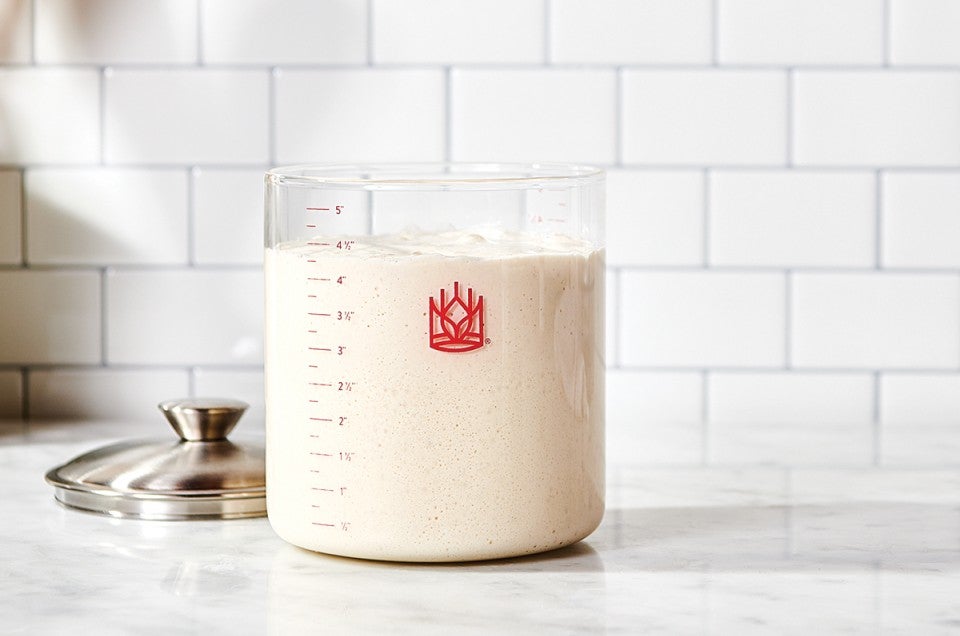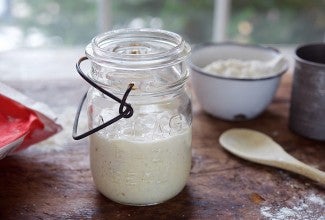Things bakers know: Sluggish starter? Add a little whole grain flour.
Rye and whole wheat flours can act like rocket fuel to boost your starter’s activity.


Consistency is not my strong suit. I have a terrible habit of picking up hobbies and putting them right back down. I declare a word of the year every January 1st and I forget it by January 20th. I still haven’t developed the meditation practice I promised myself.
This trend continues when it comes to my sourdough starter maintenance. (Shhh, don’t tell my coworkers!) I’m a forgetful sourdough parent, the kind who would leave it stranded at soccer practice because I didn’t remember I was on pick-up duty.
But that’s all fine, because I have a baker’s trick up my sleeve: Whenever I return to my starter, bashful at how long it’s been since I said hi, I give it a treat. And that treat is whole grain flour.
When we feed sourdough starter, we’re quite literally doing just that: feeding the yeast and bacteria that have been cultivated in this simple mixture of water and flour. This, in turn, helps them thrive so they can go on to both flavor and leaven our bread. And all-purpose flour works just fine as a food source, especially if you’re feeding your starter regularly (which you definitely should!). But like most living things, the yeast and bacteria in starter do especially well when they have more nutrients to snack on. “The minerals and other food present in whole grains help give a big feed, encouraging growth,” explains Baking Ambassador Martin Philip. “Using a small amount of that rocket fuel is a great trick to literally get things off the ground.”
According to Baking School Instructor Lucas Diggle, whole grains can also be helpful to encourage activity in a brand-new sourdough starter. “It’s not uncommon to begin a white liquid levain (the kind of culture that most home bakers tend to have) entirely with whole rye,” he says. “Whole grains contain exponentially more sourdough-friendly microorganisms than white flour.” Laura Valli, a doctoral student studying rye at the Washington State University’s Breadlab, adds that “rye, in particular, contains more free sugars that are easily accessible for the yeast and bacteria to feed on, and it has a higher content of starch-degrading enzymes. That all speeds up the fermentation.”

If you’re like me and have neglected your starter for a little too long — perhaps you’ve been out of town or simply forgot it in the back of the fridge — you can use a little whole grain flour (such as pumpernickel or whole wheat flour) to feed your starter and give it a boost. Martin recommends 10% to 20% whole grain in proportion to white flour, but adds that “it's flexible — you don’t need to be super precise with this.” The small amount won’t affect your starter’s flavor, and you can still use it in any recipe calling for “regular” (not whole grain) starter.
This trick also works if your starter is merely acting a little sluggish. The whole grains in these flours will accelerate fermentation of both the bacteria and the yeast in the starter, like revving the gas. This step will help get your starter ready for use more quickly.
And remember, while this trick is helpful, it’s not necessary to achieving a healthy, thriving starter. “Mature starters that have been maintained with unbleached all-purpose flour will generally revive well with all-purpose flour, even starters that have been neglected in the fridge for an extended time,” says Barb Alpern, a bread expert on our Baker’s Hotline. Laura adds, “The fact that rye flour ferments quicker than wheat flour should not lead to the assumption that the slower-fermenting wheat starter is less healthy. Wheat flour just takes longer to reach the peak ripeness.”
Maintaining sourdough starter is a practice that requires paying attention, responding to your living culture, and giving it what it needs. And sometimes, what it may need is a little boost of whole grains.
Stock up on pumpernickel or whole wheat flour so you can always have some on hand for your starter — and whole grain bread recipes to make with it.
Cover photo by Danielle Sykes; food styling by Liz Neily.


